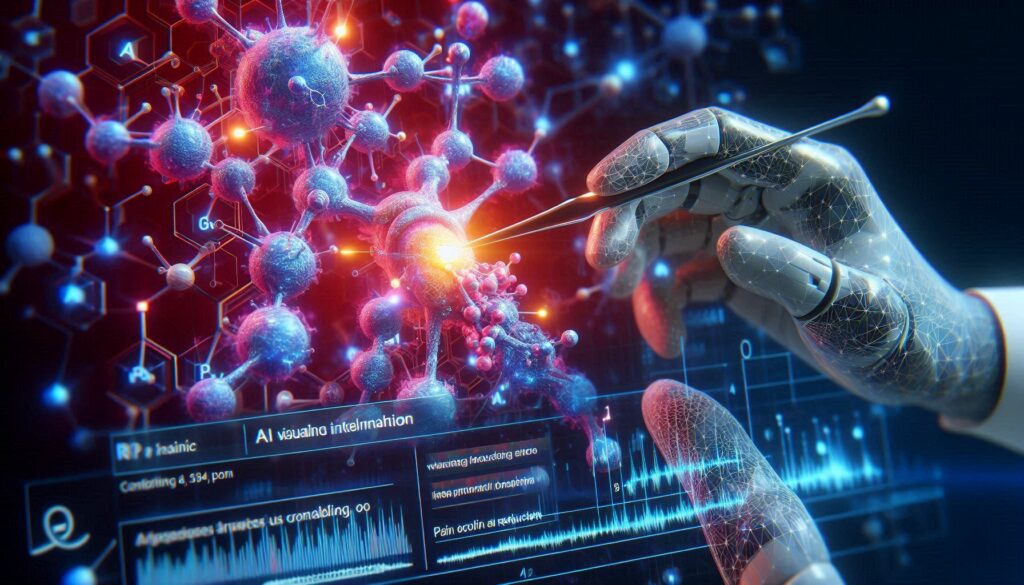
AI CERTS
7 months ago
Exploring AI’s Role in Non-Opioid Pain Relief Solutions
In a world where chronic pain affects nearly one in five Americans, the search for effective, non-addictive treatment options is more urgent than ever. According to the CDC, approximately 50 million adults in the U.S. suffer from chronic pain, impacting their quality of life and daily activities. The reliance on opioids to manage pain has led to widespread addiction and severe side effects, creating an urgent need for alternative solutions. Fortunately, advancements in artificial intelligence (AI) have opened a promising new frontier in non-opioid pain relief. This article delves into cutting-edge research led by Cleveland Clinic’s Feixiong Cheng, Ph.D., and IBM's Discovery Accelerator partnership, which uses AI in healthcare to identify new, non-opioid treatments for chronic pain.

The Need for Non-Opioid Solutions
Opioid use for pain management is a double-edged sword. While opioids can effectively alleviate severe pain, they also carry significant risks, including addiction, dependency, and overdose. A significant portion of the U.S. population relies on these substances to manage chronic pain, leading to a public health crisis. According to the National Institute on Drug Abuse, over 70% of drug overdose deaths involved an opioid in 2019. This alarming statistic highlights the critical need for safer, more effective treatments.
The path to finding non-opioid alternatives has been riddled with challenges. Many existing non-opioid treatments are either ineffective or come with their side effects. The healthcare community is in a race against time to discover new options that can effectively manage pain without the risks associated with opioids. Fortunately, researchers are harnessing AI in healthcare to revolutionize the search for non-opioid pain relief solutions.
AI in Healthcare
Artificial intelligence has already begun transforming various sectors, from finance to transportation, and now it is making significant inroads in healthcare. The integration of AI technologies into healthcare aims to enhance patient outcomes, streamline administrative processes, and facilitate groundbreaking research. A key application of AI in healthcare lies in drug discovery and development.
Professionals looking to deepen their expertise in this area can benefit from certifications such as the AI+ Healthcare Specialization offered by AI CERTs. This certification provides comprehensive knowledge of how AI technologies are applied in healthcare, covering topics like diagnostic tools, AI-driven treatments, and the ethical considerations of implementing AI in medical settings. Earning this certification empowers healthcare professionals and technologists to contribute meaningfully to advancements in AI-powered healthcare solutions.
In a recent study published by Cell Press, researchers at Cleveland Clinic's Genome Center, led by Feixiong Cheng, Ph.D., are utilizing AI-powered algorithms to repurpose FDA-approved drugs and discover new possibilities in pain management. Working alongside IBM, the team's deep-learning models have already yielded promising results by identifying specific gut microbiome-derived metabolites that can influence non-addictive pain relief.
The Role of AI in Drug Discovery

The discovery process for new pain relief drugs has historically been slow, expensive, and fraught with trial and error. The traditional drug discovery pipeline can take over a decade and cost billions of dollars, leading to high failure rates. However, the use of artificial intelligence (AI), especially deep-learning frameworks, can transform this field by making it faster, more accurate, and more cost-effective.
How AI Works in Drug Discovery
The Cleveland Clinic team’s tool, LISA-CPI (Ligand Image- and receptor's three-dimensional (3D) Structures-Aware framework to predict Compound-Protein Interactions), leverages AI to predict how specific molecules interact with pain receptors in the human body. But how does it work?
- Binding Prediction: LISA-CPI predicts if a molecule can bind to a specific pain receptor.
- Attachment Sites: It identifies where on the receptor the molecule will attach.
- Strength of Binding: It measures how strongly the molecule binds to the receptor.
- Receptor Effects: It predicts whether the binding will activate or deactivate pain signals.
This systematic approach allows researchers to streamline the process of identifying potential drug candidates. By analyzing over 2,300 FDA-approved drugs and 369 gut microbial metabolites, LISA-CPI can rapidly assess which candidates may be effective for chronic pain treatment. This significantly reduces the experimental burden, providing a faster route to discovering effective therapies.
The Power of Repurposing Existing Drugs
One of the most innovative aspects of this research is the idea of drug repurposing finding new uses for existing, FDA-approved medications. This approach offers several advantages. First, these drugs have already undergone extensive safety testing, which reduces the risk associated with introducing new compounds. Additionally, repurposing existing drugs can significantly cut down the time and cost required for development.
For example, targeting a specific group of proteins known as G protein-coupled receptors (GPCRs) has shown promise for providing non-addictive pain relief. GPCRs are involved in many physiological processes and represent a significant target for drug development. By using LISA-CPI to map out these interactions, the researchers were able to identify several drugs that could be repurposed as effective non-opioid painkillers.
In the words of Dr. Yunguang Qiu, a postdoctoral fellow in Dr. Cheng’s lab, "The question is how to target those receptors." AI allows them to do just that by predicting which existing drugs will bind to these receptors in a way that alleviates pain without the risk of addiction.
Collaborative Efforts with IBM
This groundbreaking work is part of a larger collaboration between Cleveland Clinic and IBM's Discovery Accelerator. Together, they are advancing the application of AI in healthcare, particularly in drug discovery. The partnership combines clinical expertise and advanced technology to expedite the identification of viable therapeutic candidates.
According to Dr. Yuxin Yang, a data scientist and key player in this research, their IBM collaborators were instrumental in helping develop advanced computational techniques. "Our IBM collaborators gave us valuable advice and perspective to develop advanced computational techniques," Dr. Yang explains. These technologies not only assist in identifying potential non-opioid pain relief options but also lay the groundwork for treating other diseases, such as Alzheimer’s.
The Discovery Accelerator partnership has enabled both institutions to pool their expertise and resources, accelerating the pace of innovation in life sciences. By combining IBM’s AI capabilities with Cleveland Clinic’s medical research expertise, this collaboration exemplifies how technology can be harnessed to tackle some of the world’s most pressing health issues.
Broader Applications of AI in Healthcare

While the focus of this study is chronic pain management, the AI models developed by Dr. Cheng’s team have far-reaching implications. In addition to pain relief, the LISA-CPI tool could be used to discover treatments for a variety of other conditions, including neurodegenerative diseases like Alzheimer’s.
The AI’s ability to quickly and accurately predict compound-protein interactions could revolutionize the entire drug development pipeline. This capability enables researchers to identify and test more compounds in less time, ultimately bringing effective treatments to market more rapidly.
Dr. Cheng believes that this technology represents a new era in drug discovery. "We believe that these foundation models will offer powerful AI technologies to rapidly develop therapeutics for multiple challenging human health issues," he says.
The potential applications of AI in healthcare extend beyond drug discovery. AI algorithms can assist in diagnosis, treatment planning, patient monitoring, and personalized medicine. By analyzing large datasets, AI can identify patterns and correlations that may be missed by human practitioners, leading to more accurate diagnoses and tailored treatment plans.
Key Benefits of AI in Healthcare for Drug Discovery
- Speed: AI drastically reduces the time needed for drug discovery by analyzing massive datasets quickly. This acceleration is crucial in responding to public health crises, such as the opioid epidemic.
- Cost-Effectiveness: Repurposing existing FDA-approved drugs saves money compared to developing new drugs from scratch, making treatments more accessible.
- Accuracy: AI predictions are more accurate than traditional drug discovery methods, reducing the trial-and-error approach. This accuracy leads to more effective treatments and fewer adverse effects.
- Versatility: AI models can be applied to a range of health conditions beyond chronic pain, including Alzheimer’s and other neurodegenerative diseases. This versatility ensures that the benefits of AI extend to various aspects of healthcare.
Conclusion
The collaboration between Cleveland Clinic and IBM represents a transformative shift in how we approach drug discovery and chronic pain management. With AI-powered tools like LISA-CPI, researchers can now predict drug-receptor interactions with unprecedented speed and accuracy, unlocking new possibilities for non-opioid pain relief.
This research not only provides hope for the millions of people suffering from chronic pain but also signals a broader revolution in AI in healthcare as technology continues to make its mark. As AI technology evolves, we can expect even more innovative solutions to emerge, paving the way for a future where effective pain management is accessible to all.
Source: Researchers use AI to find non-opioid pain relief options